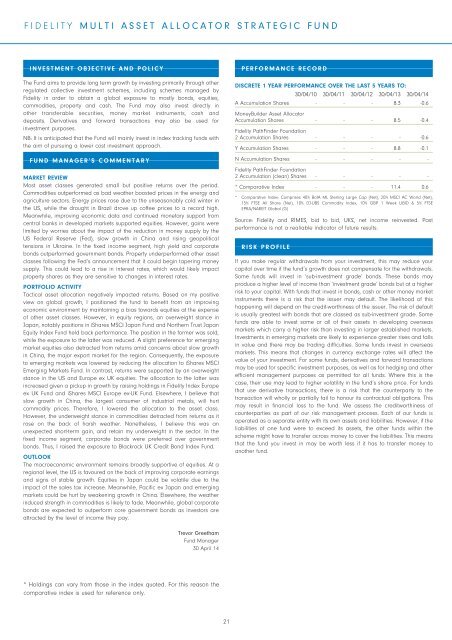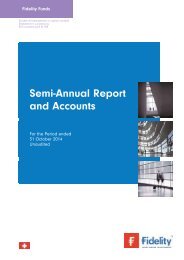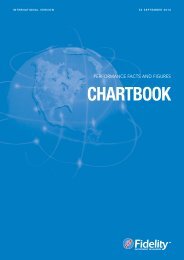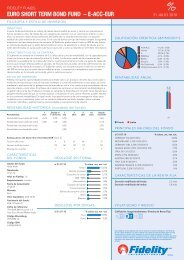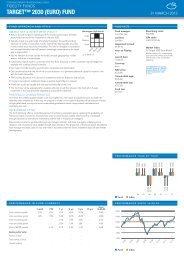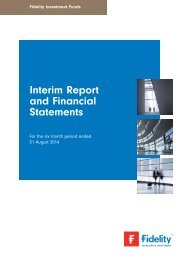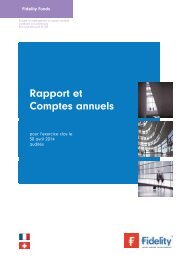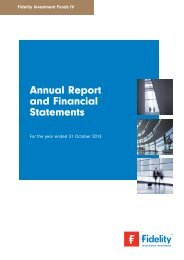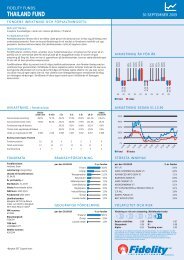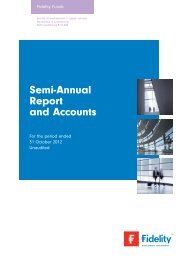Semi-Annual Reports and Accounts - Fidelity Worldwide Investment
Semi-Annual Reports and Accounts - Fidelity Worldwide Investment
Semi-Annual Reports and Accounts - Fidelity Worldwide Investment
Create successful ePaper yourself
Turn your PDF publications into a flip-book with our unique Google optimized e-Paper software.
FIDELITY MULTI ASSET ALLOCATOR STRATEGIC FUNDINVESTMENT OBJECTIVE AND POLICYThe Fund aims to provide long term growth by investing primarily through otherregulated collective investment schemes, including schemes managed by<strong>Fidelity</strong> in order to obtain a global exposure to mostly bonds, equities,commodities, property <strong>and</strong> cash. The Fund may also invest directly inother transferable securities, money market instruments, cash <strong>and</strong>deposits. Derivatives <strong>and</strong> forward transactions may also be used forinvestment purposes.NB: It is anticipated that the Fund will mainly invest in index tracking funds withthe aim of pursuing a lower cost investment approach.FUND MANAGER’S COMMENTARYMARKET REVIEWMost asset classes generated small but positive returns over the period.Commodities outperformed as bad weather boosted prices in the energy <strong>and</strong>agriculture sectors. Energy prices rose due to the unseasonably cold winter inthe US, while the drought in Brazil drove up coffee prices to a record high.Meanwhile, improving economic data <strong>and</strong> continued monetary support fromcentral banks in developed markets supported equities. However, gains werelimited by worries about the impact of the reduction in money supply by theUS Federal Reserve (Fed), slow growth in China <strong>and</strong> rising geopoliticaltensions in Ukraine. In the fixed income segment, high yield <strong>and</strong> corporatebonds outperformed government bonds. Property underperformed other assetclasses following the Fed’s announcement that it could begin tapering moneysupply. This could lead to a rise in interest rates, which would likely impactproperty shares as they are sensitive to changes in interest rates.PORTFOLIO ACTIVITYTactical asset allocation negatively impacted returns. Based on my positiveview on global growth, I positioned the fund to benefit from an improvingeconomic environment by maintaining a bias towards equities at the expenseof other asset classes. However, in equity regions, an overweight stance inJapan, notably positions in iShares MSCI Japan Fund <strong>and</strong> Northern Trust JapanEquity Index Fund held back performance. The position in the former was sold,while the exposure to the latter was reduced. A slight preference for emergingmarket equities also detracted from returns amid concerns about slow growthin China, the major export market for the region. Consequently, the exposureto emerging markets was lowered by reducing the allocation to iShares MSCIEmerging Markets Fund. In contrast, returns were supported by an overweightstance in the US <strong>and</strong> Europe ex UK equities. The allocation to the latter wasincreased given a pickup in growth by raising holdings in <strong>Fidelity</strong> Index Europeex UK Fund <strong>and</strong> iShares MSCI Europe ex-UK Fund. Elsewhere, I believe thatslow growth in China, the largest consumer of industrial metals, will hurtcommodity prices. Therefore, I lowered the allocation to the asset class.However, the underweight stance in commodities detracted from returns as itrose on the back of harsh weather. Nonetheless, I believe this was anunexpected short-term gain, <strong>and</strong> retain my underweight in the sector. In thefixed income segment, corporate bonds were preferred over governmentbonds. Thus, I raised the exposure to Blackrock UK Credit Bond Index Fund.OUTLOOKThe macroeconomic environment remains broadly supportive of equities. At aregional level, the US is favoured on the back of improving corporate earnings<strong>and</strong> signs of stable growth. Equities in Japan could be volatile due to theimpact of the sales tax increase. Meanwhile, Pacific ex Japan <strong>and</strong> emergingmarkets could be hurt by weakening growth in China. Elsewhere, the weatherinduced strength in commodities is likely to fade. Meanwhile, global corporatebonds are expected to outperform core government bonds as investors areattracted by the level of income they pay.PERFORMANCE RECORDDISCRETE 1 YEAR PERFORMANCE OVER THE LAST 5 YEARS TO:30/04/10 30/04/11 30/04/12 30/04/13 30/04/14A Accumulation Shares - - - 8.3 -0.6MoneyBuilder Asset AllocatorAccumulation Shares - - - 8.5 -0.4<strong>Fidelity</strong> PathFinder Foundation2 Accumulation Shares - - - - -0.6Y Accumulation Shares - - - 8.8 -0.1N Accumulation Shares - - - - -<strong>Fidelity</strong> PathFinder Foundation2 Accumulation (clean) Shares - - - - -* Comparative Index - - - 11.4 0.6* Comparative Index: Comprises 40% BofA ML Sterling Large Cap (Net), 20% MSCI AC World (Net),15% FTSE All Share (Net), 10% DJ-UBS Commodity Index, 10% GBP 1 Week LIBID & 5% FTSEEPRA/NAREIT Global (G)Source: <strong>Fidelity</strong> <strong>and</strong> RIMES, bid to bid, UK£, net income reinvested. Pastperformance is not a realiable indicator of future results.RISK PROFILEIf you make regular withdrawals from your investment, this may reduce yourcapital over time if the fund’s growth does not compensate for the withdrawals.Some funds will invest in ‘sub-investment grade’ bonds. These bonds mayproduce a higher level of income than ‘investment grade’ bonds but at a higherrisk to your capital. With funds that invest in bonds, cash or other money marketinstruments there is a risk that the issuer may default. The likelihood of thishappening will depend on the credit-worthiness of the issuer. The risk of defaultis usually greatest with bonds that are classed as sub-investment grade. Somefunds are able to invest some or all of their assets in developing overseasmarkets which carry a higher risk than investing in larger established markets.<strong>Investment</strong>s in emerging markets are likely to experience greater rises <strong>and</strong> fallsin value <strong>and</strong> there may be trading difficulties. Some funds invest in overseasmarkets. This means that changes in currency exchange rates will affect thevalue of your investment. For some funds, derivatives <strong>and</strong> forward transactionsmay be used for specific investment purposes, as well as for hedging <strong>and</strong> otherefficient management purposes as permitted for all funds. Where this is thecase, their use may lead to higher volatility in the fund’s share price. For fundsthat use derivative transactions, there is a risk that the counterparty to thetransaction will wholly or partially fail to honour its contractual obligations. Thismay result in financial loss to the fund. We assess the creditworthiness ofcounterparties as part of our risk management process. Each of our funds isoperated as a separate entity with its own assets <strong>and</strong> liabilities. However, if theliabilities of one fund were to exceed its assets, the other funds within thescheme might have to transfer across money to cover the liabilities. This meansthat the fund you invest in may be worth less if it has to transfer money toanother fund.Trevor GreethamFund Manager30 April 14* Holdings can vary from those in the index quoted. For this reason thecomparative index is used for reference only.21


